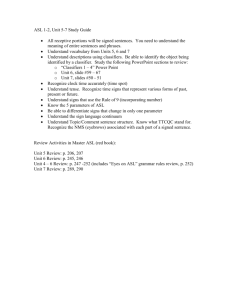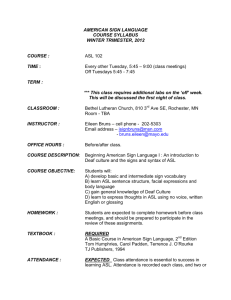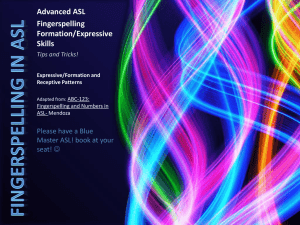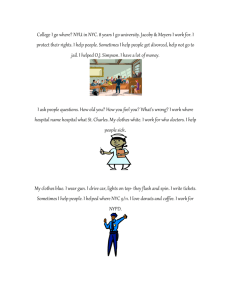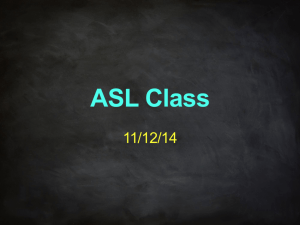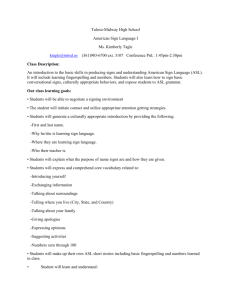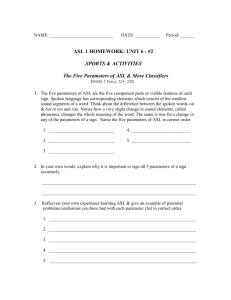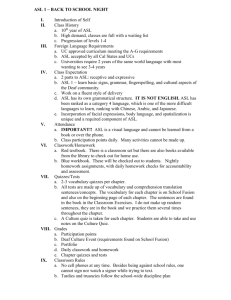new window - Blackboard - Tulsa Community College
advertisement
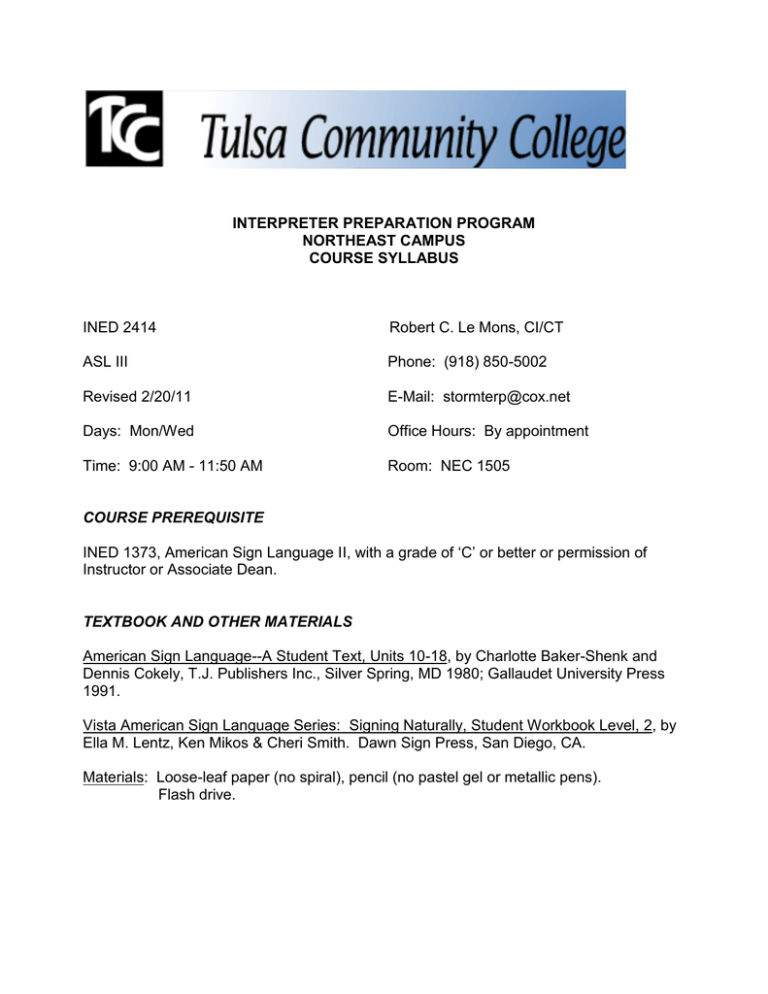
INTERPRETER PREPARATION PROGRAM NORTHEAST CAMPUS COURSE SYLLABUS INED 2414 Robert C. Le Mons, CI/CT ASL III Phone: (918) 850-5002 Revised 2/20/11 E-Mail: stormterp@cox.net Days: Mon/Wed Office Hours: By appointment Time: 9:00 AM - 11:50 AM Room: NEC 1505 COURSE PREREQUISITE INED 1373, American Sign Language II, with a grade of ‘C’ or better or permission of Instructor or Associate Dean. TEXTBOOK AND OTHER MATERIALS American Sign Language--A Student Text, Units 10-18, by Charlotte Baker-Shenk and Dennis Cokely, T.J. Publishers Inc., Silver Spring, MD 1980; Gallaudet University Press 1991. Vista American Sign Language Series: Signing Naturally, Student Workbook Level, 2, by Ella M. Lentz, Ken Mikos & Cheri Smith. Dawn Sign Press, San Diego, CA. Materials: Loose-leaf paper (no spiral), pencil (no pastel gel or metallic pens). Flash drive. ASL III PAGE 2 CATALOG DESCRIPTION This is an ASL course focusing on specific grammatical and cultural topics. Emphasis will cover the development of fluent conversational skills utilizing grammatical non-manual signals and markers. Students will learn how to narrate, describe, compare and comment. Narratives of native language users are utilized for beginning text analysis of ASL. Interactive ASL lessons without voice lead to expanded vocabulary mastery and fluency. COURSE OBJECTIVES 1. Follow a series of instructions and respond to questions appropriately. Be able to summarize and answer questions about a short story or narrate a story. 2. Use and understand the purpose served by particular language functions (identification and description). 3. Demonstrate vocabulary knowledge essential to the specific application for the chosen functions. 4. Apply grammar competencies necessary for carrying out the functions learned. 5. Perform additional culturally specific social/language responses necessary for sending and receiving effective messages in ASL (cultural norms, etc.). 6. Bringing elements learned together in unrehearsed demonstrations of communicative competency by illustrating… a. language fluency to communicate easily and smoothly without long, unnatural pauses and hesitations. b. an ability to use the language free of inaccurate articulation that impedes understanding. c. an ability to understand comfortably without repetition and rephrasing. d. culturally appropriate conversational interactive skills. d. culturally appropriate behaviors for successful interaction within the Deaf community ASL III PAGE 3 TEACHING METHODS Once inside the classroom, students will not be permitted to use voice except at instructors designated times. Talking with classmates should be done in the hall – not in the classroom. This method of total immersion will be strictly followed and your cooperation is appreciated. Only ASL will be permitted in the classroom. Signed English should not be used during class. Mouth formations unique to ASL will be permitted. Non-audible English will not be permitted during class. The manual alphabet and fingerspelling will be limited to the use of proper names, places and technical information. Class time will be conducted by using nonverbal group exercises, role-play activities, sign demonstrations, exercises, drills, video camera and play-back equipment, visual aids, document reader, computer, overhead projector, chalkboard and handouts. Vocabulary and ASL grammar will be presented via meaningful use of conversation, interaction techniques, pictures, dialogues, narratives and spontaneous experiences in the classroom. Students will use the video camera, VCR and monitor, web cam enabled computers and flash drives for both expressive and receptive development of ASL. Fingerspelling will be enhanced through the on-line fingerspelling lab. Discussion, questions, and class participation by students is strongly encouraged. EVALUATION TECHNIQUES Students will demonstrate expressive skills of stories, skits, dialogues, and assignments in front of the class and, at certain times, will be videotaped or by web cam for evaluation and instructor feedback. Instructor will interact with students by signing vocabulary, dialogues and stories. At the discretion of the instructor, there will be two recorded pop quizzes given during the semester. Pop quizzes cannot be made up in any way. The quizzes and final examination assess receptive skills and will be written. ASL III PAGE 4 Evaluations will focus on the student's ability to read the instructor's discourse in sign language and expressively demonstrate content in ASL. GRADING SYSTEM ASL Demonstrations ………..…. Quizzes …… Video Homework Assignments . Textbook Homework Units ……. On-line Lab Assignments ……… Community Interaction ………… Comprehensive Final Examination Points Earned: 609 563 517 472 Below 2 required 2 required 3 required 5 required 3 required 3 required 655 608 562 516 472 100 points 50 points 25 points 10 points 5 points/week 5 points 200 100 75 50 65 15 150 Total Possible Points 655 A B C D F (93% (86% (79% (72% - 100%) - 92%) - 85%) - 78%) Class attendance and participation may be used to determine borderline final grades. The instructor may assign a grade of AW for any student who stops attending class. ATTENDANCE POLICY Regular attendance is encouraged as well as essential for continuing enrollment in interpreting courses. Three absences are allowed due to personal considerations/ reasons. A five point deduction from your final grade for each absence beyond three will be assessed. It is the sole responsibility for students to get notes, assignments, etc., from classmates for any classes missed. If a student is considering withdrawing from class, s/he is encouraged to meet with the instructor before initiating a withdrawal. INCLEMENT WEATHER TCC rarely closes. If extreme weather conditions or emergency situations arise, TCC always gives cancellation notices to radio and television stations. This information is also posted on the TCC website (www.tulsacc.edu). ASL III PAGE 5 E-MAIL All TCC students receive a designated “MyTCC” e-mail address (ex: jane_doe@mail.tulsacc.edu). All communications to you about TCC and course assignments will be sent to your MyTCC e-mail address. You must use MyTCC e-mail to send e-mail to, and receive e-mail from, the instructor regarding this course. LATE ASSIGNMENTS AND MAKE-UP TEST POLICY No make-up is available unless arrangements have been made BEFORE the class period of the due date. Written portions of quizzes can be made up in the Testing Center. Arrangements must be made prior to the assessment date with the instructor for makeups on the sign demonstration assignments and the receptive portions of quizzes or exams. Students may request approval for make-up by email or by phone. A message left on voice mail is considered an appropriate request. Assignments must be completed within one week from the date of the assignment. There are no make-ups for pop quizzes. A ten percent penalty will be applied for any late work. Make-up exams are administered through the Testing Center, NE 1415, (595-7534). Please check their schedule for times of test administration. COURSE WITHDRAWAL The deadline to withdraw from a course shall not exceed ¾ the duration of any class. Contact the Counseling Office at any TCC campus to initiate withdrawal from a course (‘W’ grade) or to change from Credit to Audit. Check the TCC Academic Calendar for deadlines. Students who stop participating in the course and/or fail to withdraw may receive a course grade of ‘F’ or ‘AW’ which may have Financial Aid consequences. STUDENTS WITH DISABILITIES It is the policy of TCC to accommodate students with disabilities pursuant to federal and state law. Any student with a disability who requires an accommodation; for example, in seating placement or an arrangement for examinations, should inform the instructor at the beginning of the course. The assistant dean of Liberal Arts is also available to assist with accommodations. Students with disabilities are also encouraged to contact the disABLED Student Resource Center at Metro Campus, Room 331B, (595-7115). Students with a hearing loss are encouraged to contact the Resource Center for the Deaf and Hard of Hearing at Northeast Campus, Room 2163, (595-7428 V/TTY). ASL III PAGE 6 SYLLABUS CHANGES Occasionally changes to the syllabus may be necessary. Students will be notified of any changes to the syllabus in writing via Blackboard. LAB FACILITIES The Sign Language Center at the Facet Center is available according to the days and hours posted at their location. ACADEMIC DISHONESTY Academic dishonesty (cheating) is defined as the deception of others about one’s own work or about the work of another. Academic dishonesty or misconduct is not condoned or tolerated at campuses within the Tulsa Community College system. Tulsa Community College adopts a policy delegating certain forms of authority for disciplinary action to the faculty. Such disciplinary actions delegated to the faculty include, but not limited to, the dismissal of disrespectful or disorderly students from classes. In the case of academic dishonesty a faculty member may: Require the student to redo an assignment/test or require the student to complete a substitute assignment/test. Record a “zero” for the assignment or test in question. Recommend to the student that she/he withdraw from the class or administratively withdraw the student from the class. Record a grade of ‘F’ for the student at the end of the semester. Faculty may request that disciplinary action be taken against a student at the administrative level by submitting such a request to the Dean of Student Services. TENTATIVE CLASS AGENDA The class agenda is a general guideline for the course and is subject to announced changes at the discretion of the instructor. ASL III PAGE 7 Date Unit of Study_______________ January 10 & 12 Course Syllabus & Review SN Unit 13 ‘Locating Things Around the House’ CB Unit 10 ‘Sentence Types’ January 19 SN Unit 13 ‘Locating...’ CB Unit 10 ‘Sentence...’ January 24 & 26 SN Unit 13 ‘Locating...’ CB Unit 11 ‘Time’ January 31/ February 2 SN Unit 14 ‘Complaining, Making Suggestions & Requests’ CB Unit 11 ‘Time’ Textbook Homework SN Unit 13 (2/2) Quiz #1 SN Unit 13, CB Introduction & Units 10 & 11 (2/2) February 7 & 9 SN Unit 14 ‘Complaining...’ CB Unit 12 ‘Pronominalization’ February 14 & 16 SN Unit 14 ‘Complaining...’ CB Unit 12 ‘Pronominalization’ Video Homework #1 (Mouth Morphemes) (2/16) February 21 & 23 SN Unit 15 ‘Exchanging Personal Information: Life Events’ CB Unit 13 ‘Subjects & Objects’ Textbook Homework SN Unit 14 (2/23) February 28 March 2 SN Unit 15 ‘Exchanging...’ CB Unit 13 ‘Subjects...’ Sign Language Specialists w/e 2/14 & 2/28 (3/2) ASL III PAGE 8 Date Unit of Study_______________ March 7 & 9 SN Unit 15 ‘Exchanging...’ CB Unit 14 ‘Classifiers’ ASL Camera Demonstration #1 (3/9) March 14 & 16 SPRING BREAK March 21 & 23 SN Unit 16 ‘Describing & Identifying Things’ CB Unit 14 ‘Classifiers’ Textbook Homework SN Unit 15 (3/21) Sign Language Specialists w/e 3/14 (3/21) Video Homework #2 (Your Life Events) (3/23) March 28 & 30 SN Unit 16 ‘Describing... CB Unit 15 ‘Locatives’ April 4 & 6 SN Unit 16 ‘Describing...’ CB Unit 15 ‘Locatives’ Sign Language Specialists w/e 3/28 (4/4) Quiz #2 SN Units 14 & 15, CB Units 13 & 14 (4/6) April 11 & 13 SN Unit 17 ‘Talking About The Weekend’ CB Unit 16 ‘Pluralization’ Textbook Homework SN Unit 16 (4/13) April 18 & 20 SN Unit 17 ‘Talking... CB Unit 16 ‘Pluralization’ Sign Language Specialists w/e 4/11 (4/18) Video Homework #3 (Using Classifiers) (4/20) April 25 & 27 SN Unit 17 ‘Talking...’ CB Unit 17 ‘Temporal Aspect’ Sign Language Specialists w/e 4/25 (4/27) ASL III PAGE 9 Date Unit of Study_______________ May 2 & 4 Textbook Homework SN Unit 17 (5/2) Final Exam (5/2) ASL Camera Demonstration #2 (5/4) Community Interactions (3) due (5/4) Sign Language Specialists w/e 4/29 (5/4) HONOR YOUR JOURNEY
